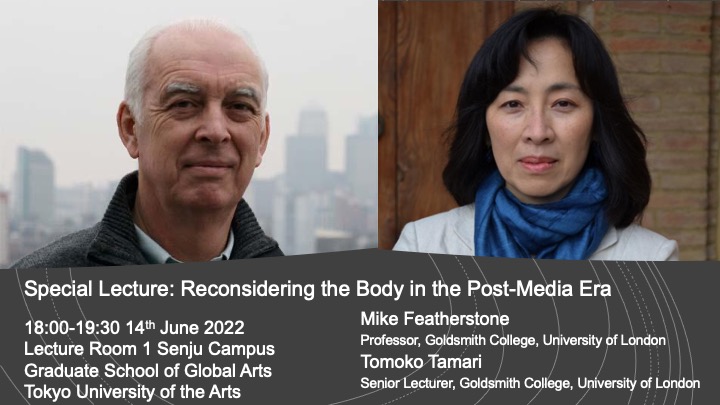
特別講義:ポストメディア時代の身体再考
Reconsidering the Body in the Post-Media Era
以下のとおり、ロンドン大学ゴールドスミスカレッジ、Institute for Creative and Cultural Entrepreneurship(ICCE)のマイク・フェザーストーン教授と玉利智子上級講師をお招きして、ポストメディア時代における身体をめぐって研究会を行います。関心のある方はぜひお越しください。
日 時:2022年6月14日(火) 18:00-19:30
場 所:東京藝術大学千住キャンパス第1講義室(1F)
(東京都足立区千住1-25-1 ※場所が千住キャンパスなのでご注意ください)
http://ga.geidai.ac.jp/access/
講演者:マイク・フェザーストーン(ロンドン大学ゴールドスミスカレッジ教授)
玉利智子(ロンドン大学ゴールドスミスカレッジ上級講師)
司 会:毛利嘉孝(東京藝術大学大学院国際芸術創造研究科教授)
主 催:東京芸術大学大学院 国際芸術創造研究科 毛利嘉孝研究室
ポストメディア研究会 (http://postmedia-research.net/)
予約不要・無料。
言 語:英語(通訳はありません)
このセミナーは、科研費基盤B「ポストメディア文化研究の理論構築:創造産業の日英比較を中心に:代表:毛利嘉孝(研究番号17H02587)」(Post Media Research Network)によって運営されています。
Lecture 1: Rethinking the Body beyond Consumer Culture
Mike Featherstone
Goldsmiths, University of London
The body is accorded a central status within consumer culture through a constant flow of images of youth, fitness and beauty. The general ‘if you look good you feel good’ philosophy combined with the advocacy of instrumental body transformation regimes, contrasts with a second view of the body ‘the body without image,’ the body in motion, the affective body which operates in everyday life. This presentation seeks to update the discussion by addressing three further orientations to the body which can be seen as salient today: the digital data body; Anthropocene bodies; and interdependent bodies (our wider transspecies and planetary bodily relations).
Lecture 2: Embodied intelligence and digital information technology: AI and the body materiality
Tomoko Tamari
Goldsmiths, University of London
Digital information technologies, such as computer programmes with artificial intelligence are becoming ubiquitous. This situation could suggest not just changes existing social systems, but also influencing the fundamental human-machine (technical object) relations. The paper attempts to explore the probable consequences of the notion of ‘the body as data’ and elaborate the significance of body materiality in the field of the computer science. The paper also discusses risks of losing skills, knowledge and experience about technical objects which could be replaced by mechanical automated production processes in the course of technological development. Drawing on Simondon’s concept of ‘concretization’ and Stiegler’s noton of ‘symbolic misery’, the paper proposes a need to work on the question of the potential practice of bio-social concretization to consider the ever-changing relationship between humans and technical objects.
